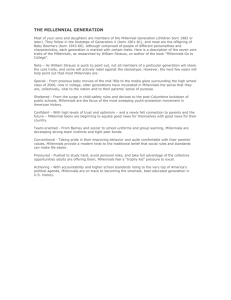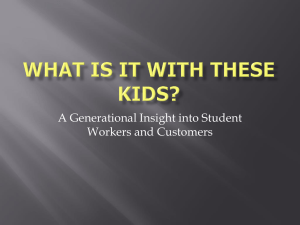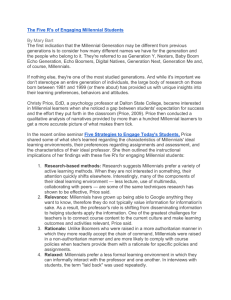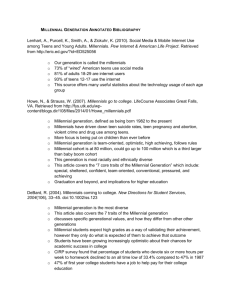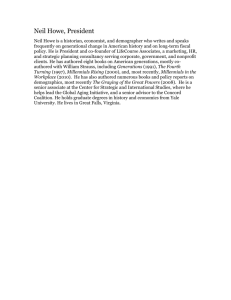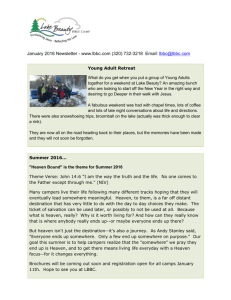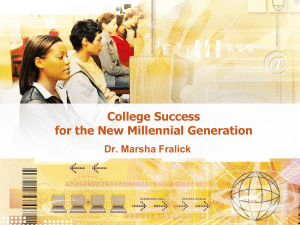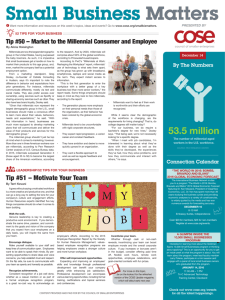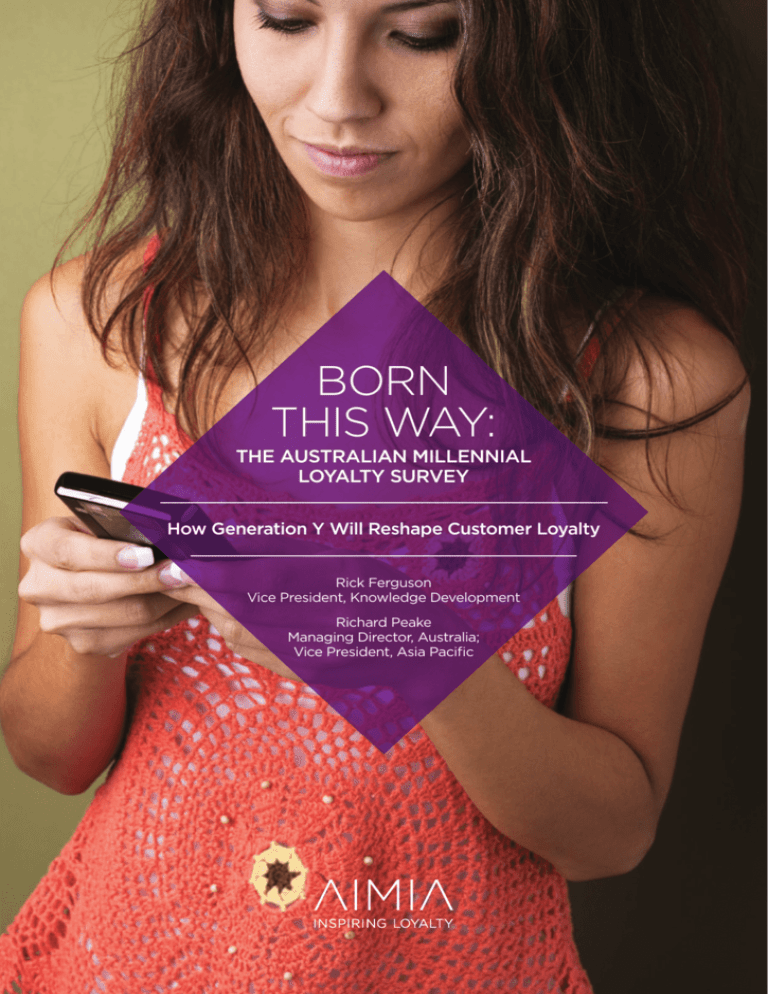
BORN
THIS WAY:
THE AUSTRALIAN MILLENNIAL
LOYALTY SURVEY
How Generation Y Will Reshape Customer Loyalty
Rick Ferguson
Vice President, Knowledge Development
Richard Peake
Managing Director, Australia;
Vice President, Asia Pacific
01 / Australian Millennial Loyalty Survey
YOUR
BUSINESS
RESULTS
DELIVERED
OUR
INSIGHT
aimia.com
© 2013 Aimia Inc. All Rights Reserved.
Australian Millennial Loyalty Survey / 1
SUMMARY | TABLE OF CONTENTS
In the summer of 2012, Aimia Inc. commissioned
research firm Harris Interactive to conduct a survey
of the Millennial consumer segment (ages 19-29 years
old) in Australia and New Zealand. This proprietary
research built on previous consumer surveys
conducted among the same segment in Canada, the
United Kingdom and the United States. The survey
focused on Millennial attitudes and behaviours relating
to brand loyalty, data privacy, mobile and social media
marketing, and rewards program participation.
We conducted this quantitative research to provide
a foundation for the publication of this report, which
compares the attitudes of Millennial consumers
to non-Millennials in Australia. We have already
published similar reports that highlight our research
findings for Canada, the United Kingdom, and
the United States, which can be found in the
Knowledge Center at aimia.com.
This report presents a comprehensive view of
customer loyalty expectations among the next great
generational cohort of Australian consumers. Among
our high-level findings are these important insights:
>More than four out of five (81 percent) Millennial
consumers claim participation in loyalty and reward
programs. These participation rates are consistent
with our findings in other developed markets,
indicating a mature, nearly ubiquitous market
for Australian loyalty programs.
>Over three-quarters (76 percent) of Millennials are
more likely to choose a brand that offers a loyalty
or rewards program over a brand that doesn’t
offer one.
>More than half (54 percent) of all Millennials
“agree” or “strongly agree” that loyalty rewards
and incentives would make them more likely to
share personal information with marketers
— a significantly higher percentage than older
consumers (40 percent).
>Nearly half of Millennials (46 percent) are willing
to promote products or brands through social
media in exchange for rewards — a much higher
percentage than non-Millennials (31 percent).
>Over one-quarter of Millennials (29 percent) are
interested in using a mobile device as a substitute
for plastic loyalty cards, more than double the
percentage of non-Millennials (14 percent).
>In general, Millennials are less concerned than
non-Millennials with data privacy and security.
Of all surveyed marketing channels, loyalty and
reward programs are perceived as the most
privacy-friendly by Millennials: Only 19 percent
of Millennial loyalty program members are
concerned about sharing personal information
with program operators.
>More than half of Millennials surveyed (54 percent)
agree they are more likely to share personal
details with a brand that offers loyalty and
reward incentives.
>When asked about the appeal of multi-brand,
single currency coalition loyalty programs,
77 percent of Millennials rate the ability to earn
a common currency as their top desired loyalty
program benefit.
Table of Contents
2 Introduction
4 Methodology
6 Generation Why
8 Millennial Brand Loyalty
10 The Millennial Loyalty Challenge
12 Millennials and Technology: All Marketing is Mobile
14 Millennials and Privacy: The Value Exchange
16 Millennials and Rewards: Playing The Game
18 Millennials and the Coalition Opportunity
20Conclusions: Answering Generation Why
22Survey Questions
23About the Authors
© 2013 Aimia Inc. All Rights Reserved.
2 / Australian Millennial Loyalty Survey
INTRODUCTION
Peter Sheahan, an Australian
consultant and author of
Generation Y: Thriving and
Surviving with Generation Y
at Work, describes Australian
Millennials as street smart —
mature, resilient, fast-learners
who know how to survive urban
life. He also suggests they are
fully informed of current issues
and highly tech-savvy, but are
also in search of meaningful
experiences and motivated
by deeper concerns than just
money. These young Australians
tend to be skeptical, overstimulated, and impatient, he
adds, but are also generally
informal — relaxed when they
communicate, blunt when they
speak, and unwilling to follow
rules for the sake of following
rules. Why should marketers care
about this cohort? According to
Australian social demographer
Mark McCrindle, Generation Y
comprises 4.2 million Australians,
making Millennials 20.5 percent
of Australia’s total population
of 20.7 million, or the country’s
second-largest generation after
Generation X. The sheer size of
this cohort makes them by default
the next great engine of the
Australian consumer economy.
Other researchers have also
attempted to define this
generation. In their 2004 paper
The Millennial Effect, Implications
for Academic Development, Diana
Jonas-Dwyer and Romana Pospisil,
university educators from Perth,
describe the country’s Millennials
as confident, hopeful, inclusive,
goal-oriented, and civic-minded.
Millennials have high expectations,
are often under pressure to
achieve, want to be challenged,
and desire flexibility.
This generation’s coming of
age has profound implications
for marketers, especially as the
youngest Millennials are now
beginning higher education and
will soon enter the prime of
their lives as consumers. This
coming-of-age story ties directly
into the flip side of the Millennial
storyline — that is, the effects of
© 2013 Aimia Inc. All Rights Reserved.
the aging, retirement-bound Baby
Boom generation on the world
economy. In the United States,
for example, a 2008 McKinsey
Global Institute study predicts
that the ongoing retirement of
Baby Boomers will siphon roughly
USD 400 billion annually from the
U.S. economy. We may anticipate
a corresponding impact in
Australia and throughout
the developed world.
relationships drive their loyalty?
How do these attitudes differ
from previous generations?
>Technology: Everyone
assumes that Millennials eschew
email, tweet everything, and
only respond to marketing
messages forwarded by their
peers via smartphones. Are
these assumptions true? Or
do Millennials have a much
more complex relationship to
marketing technologies than
we might think?
This impending contraction leaves
the Millennial Generation to pick
up the slack in consumer spending.
>Privacy: Facebook CEO
In doing so, it’ll face an uphill
Mark Zuckerberg (age 29)
battle. The unemployment rate
famously declared that the
among Millennials is higher than
age of privacy is over. Do his
that for older populations in most
fellow Millennials feel the same
developed economies, including
way? How important is online
Australia. As a result of education
privacy and data security to
expenses, many Millennials owe
this generation? What perks
substantial debt. Others depend
and benefits must marketers
on financial support from their
offer to encourage them to
families, or have moved back in
share personal information
with their parents. Coming of age
that improves marketing ROI?
during the Great Recession has
also instilled in them a healthy
>Rewards: The modern loyalty
economic conservatism.
marketing industry was built
on the proclivities of Baby
Millennial consumer behaviour
Boomers, who prefer travel and
has therefore been shaped by the
merchandise rewards fueled by
world in which Millennials came
credit card spend. Will Millennial
of age — like the Lady Gaga (age
business travelers and heads of
27) song says, they were “born
households mimic the behaviour
this way.” Given the importance
of Baby Boomers? Or will they
of this generation to the global
rewrite the rules of reward
economic recovery, and the
program engagement?
future of Australian commerce,
it’s imperative that marketers
While our survey results allow
develop sustainable, reciprocal,
us to paint some broad strokes
value-added relationships with
in depicting Australian Millennial
Millennials based on deep insight
behaviour, we know that you can’t
into their behaviour.
hope to understand them simply
by making sweeping assumptions.
That’s where Aimia can help.
Generation Y is a generation of
In partnership with market
individuals — and if you want to
research firm Harris Interactive,
build lasting loyal relationships
we surveyed 1,250 Australian
with them, you’ll need to
consumers — including more
understand them as such.
than 600 Millennials — to help
you understand their attitudes
That’s where loyalty management
and behaviours toward customer
can help. No other marketing
loyalty and reward initiatives.
discipline is better equipped to help
In particular, we focused on
you to build profitable relationships
Millennial attitudes toward:
with Millennial consumers based
>Loyalty: What makes a Millennial on the drivers of value, trust, and
information. We hope this research
consumer brand loyal? What
will help you get started.
aspects of consumer-brand
Australian Millennial Loyalty Survey / 3
“Technology
is a huge part
of my life. From the
moment I wake up to
when I go to bed, I have my
phone on me. I’m on my computer
multiple times a day, working,
sending emails...
It’s a huge part
of my life.”
—Adam, 21
© 2013 Aimia Inc. All Rights Reserved.
4 / Australian Millennial Loyalty Survey
METHODOLOGY
>Aimia commissioned research firm Harris Interactive to conduct a survey regarding the attitudes and
opinions of Millennials (age 19-29 at the time of the survey) compared to non-Millennials (age 30+) in
Australia, New Zealand, Canada, the United Kingdom, and the United States. The survey covered many
topics related to reward program membership and customer loyalty including: technology use, reward
program participation, mobile marketing, privacy preferences, and brand loyalty.
>This portion of the study was conducted online in Australia in 2012. Data collection was conducted from
March 21 — March 29.
>Qualified respondents were age 19 or older and resided in Australia.
>Individual interviews averaged 17 minutes in length.
>The data was weighted by age, gender and geographical region to be representative of the general
population (not just the online population) of age 19+ respondents in Australia.
>Due to rounding, some survey question responses may not add up to 100 percent.
The infographic illustrations in this paper include the survey question numbers referenced; the actual survey
questions can be found on page 22.
© 2013 Aimia Inc. All Rights Reserved.
Australian Millennial Loyalty Survey / 5
“If a
reward
program is
good, loyalty is
the word that comes
to mind. Because if the
program provides good service,
then I’ll continue to use it.
But if there are stipulations
behind it, like having to use
your points in a certain
time frame, then I
won’t use it.”
—Torin, 26
© 2013 Aimia Inc. All Rights Reserved.
6 / Australian Millennial Loyalty Survey
GENERATION WHY
Generation Y is often described
in terms of contrast to previous
generations: The term “Generation
Y” itself implies that it is simply
an offshoot of Generation X,
which was itself the cause of
much handwringing in the 1990s.
Generation Y has been identified
in turn by labels optimistic
(Generation Next), insulting
(Generation Me; the Peter Pan
generation), and dismissive
(Echo Boomers or the Boomerang
Generation). While there are no
universally agreed-upon labels
or even time frames used for
this generation, for the purposes
of our study we prefer the term
“Millennial” generation as the most
neutral descriptor. After all, the one
thing on which we can all agree is
that this generation is the first to
come of age in the 21st Century —
and that fact alone makes
them special.
Opinions about the Millennial
generation vary wildly. On one
extreme you’ll find Jean Twenge,
author of the 2007 book Generation
Me, which describes a cohort
rife with entitlement, crippled by
narcissism, and wholly rejecting of
social conventions. On the other
extreme, you’ll find historians
William Strauss and Neil Howe,
who describe in their 2000
book Millennials Rising a cohort
destined to become the next
“Hero Generation,” more akin to its
Greatest Generation grandparents
and great-grandparents than its
Baby Boomer or Generation X
parents. The truth is most likely
somewhere in between.
We’ll refrain here from making
sweeping generalizations.
Looking solely at the demographic
data supplied by our own
survey and supplemented by
extensive secondary research,
we can draw the following
supportable conclusions about
Australian Millennials:
>They’re better educated. More
than one third (34 percent)
of Australian Millennials have
already earned a bachelor’s
degree or higher. This
outstanding rate is nearly
double that of the Gen X-ers
and Baby Boomers represented
by our survey. Given their
educational attainment,
Millennials are most certainly
harder to persuade, more
challenging to convince, and
more likely to be skeptical of
social and economic constructs
— especially marketing.
>They earn more. More than half
(59 percent) of the Millennials
surveyed already claim earnings
of more than AUD 50,000.
A quarter of the group have
already surpassed AUD 100,000.
© 2013 Aimia Inc. All Rights Reserved.
Both income brackets are greater
than the equivalent in previous
generations — and some
Millennials have yet to enter the
workforce. Rapidly advancing
income, which correlates with
their higher education levels,
puts the Millennials on the
brink of becoming the most
important target market
in Australia.
>They’re wired. Australian
Millennials are much more likely
to be heavy internet users
than previous generations. On
average, our survey reveals more
than 22 hours of internet usage
per week, regardless of the
device used to access the web —
desktop, laptop, smartphone, or
tablet. One-third of all Millennials
exceed this average, a far greater
percentage than among older
consumers. The implications
for marketers are everywhere
— in campaign development,
analytics, communications,
advertising, and social media,
to name a few areas.
In general, marketers will face a
generation ready to contribute its
share to the Australian economy and
willing to engage in relationships
with its favourite brands, but
reluctant to spend without a clear
expectation of value. The central
question that loyalty marketers will
need to answer for this consumer
group is not “How” or “What,”
but rather, “Why?” Why should a
Millennial consumer raise her hand
and ask to be identified through
your loyalty or reward initiative?
Why should she download your
smartphone app? Why should she
respond to your location-based
offer? What’s in it for her?
In short, don’t think of Millennials
as Generation Y. Think of them as
Generation Why.
Australian Millennial Loyalty Survey / 7
GENERATION WHY
Australian Millennial consumers are better educated, rapidly advancing to upper income brackets, and more likely
to be heavy internet users.
MILLENNIAL RESPONDENT DEMOGRAPHICS:
50 50
51 49
THE AGGREGATE SPENDING POWER OF
AUSTRALIAN MILLENNIALS IS GROWING…
SURVEY RESPONDENT EDUCATION:
34%
37%
23 12 12
10 4
18 15 11
10 4
Year 11 or Less
Year 12
Certificate II or II
Certificate III or IV
Diploma/Advanced Diploma
Bachelor’s Degree or Higher
…AND THEY’RE THE MOST WIRED
GENERATION IN AUSTRALIAN HISTORY.
34%
28%
50%
52%
25 14 13
24 22 13
33 17
25 23
Medium (8-21 hours)
Heavy (22+ hours)
Light (0-7 hours)
1.7 Billion
4.2 Million
20.5%
Estimated number of
Millennials worldwide
Estimated number of
Australian Millennials
Percentage of
Millennials in the
Australian population
© 2013 Aimia Inc. All Rights Reserved.
8 / Australian Millennial Loyalty Survey
MILLENNIAL BRAND LOYALTY
>Trust: Relationship value
Loyalty marketers understand that
increases as the level of trust
there is a fundamental difference
increases between loyal
between customer loyalty and
customers and the brand. Trust
customer relationships. Customer
increases when you deliver
loyalty is fueled by fundamental
on your brand promise, use
product and service drivers, while
customer data responsibly,
relationships are fueled by trust,
and deliver relevance through
commitment, and reciprocity. We
marketing insight.
wanted to know if Millennials viewed
brand loyalty and relationships any
differently than older consumers — >Commitment: For a brand to
sustain a relationship with a loyal
so we asked them.
customer, it must demonstrate
commitment to the relationship
Customer loyalty is created by
by executing on the fundamental
the same fundamental drivers
drivers of loyalty such as quality,
first articulated by legendary
service, experience, and value.
McDonald’s CEO Ray Kroc:
>Quality: Customer loyalty is
driven by the quality of your
products and services in
contrast to the quality of
your competition.
>Service: Loyalty is driven by
the responsiveness and training
of your front-line employees,
and the ease of use of your
virtual tools.
>Cleanliness: Loyalty is driven
by the experience customers
undergo while doing business in
your physical or virtual locations.
This driver is more broadly
labeled as “Experience.”
>Value: Loyalty is driven by the
prices of your products and
services, which must be in line
with your competitors’ prices
and in line with your delivery of
the other three drivers.
>Reciprocity: Relationship value
increases as the amount of
information flowing between the
brand and its loyal customers
increases. Information becomes
the data that fuels recognition
and reward, which increases the
flow of information from loyal
customers and creates a positive
feedback loop.
Marketers construct customer
relationships with the tools of
loyalty management. Therefore,
we asked our Australian Millennial
survey respondents to articulate the
importance of different elements
of loyal relationships to their
consumer interactions. You can
see the high-level findings in the
illustration on page 9.
From these survey findings, we
may extrapolate the following
insights for marketers attempting
to extend both the value and the
length of their relationships with
Millennial consumers:
Customer relationships, in contrast,
are a byproduct of customer loyalty.
These relationships are defined
>Millennial loyalty is driven by
by the reciprocal added value
quality and value. Contrary
exchanged between brands and
to stereotypes that portray
their customers. They’re defined by
Millennials as perpetual
two variables: value and length. You
adolescents shaped by
create loyal customers by delivering
overbearing helicopter parents,
on Ray Kroc’s loyalty drivers, and
they are in fact the self-serve
you keep customers loyal by building
generation: They are used to
relationships with them based on the
accessing large amounts of
following three building blocks:
information via online tools to
make purchase decisions based
on pragmatic expectations
of quality and value. The
recession has made them
© 2013 Aimia Inc. All Rights Reserved.
more price-sensitive than their
parents — but they value
quality above all.
>Loyalty programs are a
differentiator. When Millennials
perceive relative parity between
you and your competitors, they’ll
choose their brand relationships
based on the expectation of
added value in the form of
rewards and incentives. Over
three-quarters of Australian
Millennials (77 percent) rate
loyalty and reward programs
as “very” or “somewhat” likely
to make a difference in their
purchase decisions.
>Trust is enhanced by rewards.
Providing an environment of trust
is a crucial step for marketers
hoping to build a platform for
Millennials to share personal
information. When asked in
an open-ended question what
value brands needed to provide
in exchange for sharing their
personal information, Millennials
identified reward incentives as
the top factor fueling their trust
— and in greater numbers than
their older counterparts. They
also expect brands to secure
their personal data and to use
it in an ethical manner, but
they are less concerned
with both factors than the
Australian non-Millennials.
>Loyal Millennials will share
more. Like older consumers,
Millennials are apt to feel and
act more loyal to a brand that
offers a loyalty program: Over
three-fourths of Millennials are
likely to purchase more from,
feel more loyal to, and tell their
networks about brands that
offer reward incentives —
numbers in line with older
generations. Where Millennials
become even more valuable to
marketers is in their willingness
to actively promote products
and services in exchange for
rewards. They understand the
importance of customer
word-of-mouth — and for the
right incentives, they’ll become
brand advocates.
Australian Millennial Loyalty Survey / 9
MILLENNIAL BRAND LOYALTY
Marketers build relationships with consumers based on the foundational building blocks of TRUST, COMMITMENT,
and RECIPROCITY. Australian Millennials are no different — and the tools of loyalty management will remain
essential to building profitable relationships with them.
TRUST: Trust is a crucial step for marketers hoping to collect personal information from Millennials.
Australian Millennials identify rewards and incentives, data security, and ethical use of data as their top
requirements for brands that wish to collect and use customer data for marketing.
Q. What value would you need in order to share personal information with marketers?
28% 22%
16 26
10 14
4 9
5 5
COMMITMENT: Brands demonstrate commitment to consumers through execution on the fundamental
drivers of loyalty. Australian Millennials value quality above all other loyalty drivers, but are more priceconscious than older consumers. Meanwhile, three-quarters of Millennials seek out loyalty programs.
Q. What factors make you loyal to a brand?
(percent ranked #1)
Q. How likely is a loyalty program to make you choose
Brand A over Brand B?
44%
54%
Very/Somewhat likely (41%/36%)
Neither likely nor unlikely
Somewhat unlikely
Not at all likely
77%
17 5 1
RECIPROCITY: In exchange for a positive loyalty program experience, Australian Millennials will do
more future business with you and feel more loyal to your brand than Non-Millennials — and they’re
more likely to promote your brand to their social networks.
Q. When participating in a loyalty program, how likely are you to:
Tell friends about
positive reward
experiences?
Be or feel more
loyal to a brand
after earning
a reward?
78%
73%
73%
66%
17 5
23 4
18 10
25 10
Do more business
with a brand after
earning a reward?
Promote products or
brands through social
media in exchange
for rewards?
Net Neutral
Likely
73%
65%
46%
31%
20 7
28 26
Not Likely
26 9
27 42
© 2013 Aimia Inc. All Rights Reserved.
10 / Australian Millennial Loyalty Survey
THE MILLENNIAL LOYALTY CHALLENGE
Our survey demonstrates that
Australian Millennials share loyalty
drivers with older consumers, and
are about equally likely to feel and
act more loyal to brands that offer
loyalty and reward programs. We
also identified a few key differences
that mark this generation: The
recession has actually made these
consumers more price conscious
than their parents (although they
still value quality above all), and
they’re more willing to act on your
behalf by spreading the good news
about your brand — provided you
first put some value on the table.
That’s a good-news story for
loyalty marketers: We know the
tools of loyalty management work,
and we know that Millennials will
respond to them. There is, however,
one key difference in Millennial
brand relationships — and it lies
at the intersection of loyalty
and technology.
As the illustration page 11 shows, the
advent of smartphone technology
means Millennials have far more
information at their fingertips to
help them make purchase decisions
— and it is information that exists
entirely outside of your control as
a marketer. Brands once enjoyed
a captive audience: The only
way customers could compare
your prices and service with the
competitor down the street was to
make the trip. Word of mouth about
the quality of your products or the
level of your customer service once
spread like molasses — but now
spreads like a virus.
Given this added challenge in
marketing to Millennial consumers,
it’s imperative that marketers
leverage the tools of loyalty
management to pierce through the
information overload and deliver
relationship value at the level of the
individual customer. Here are just a
few ways that mobile technology
influences Millennial relationships:
>To Millennials, price is
transparent. Over half of all
Millennials (51 percent) use their
mobile devices to compare
prices while in store. This is a
significant behaviour shift from
that of older consumers, who
tend to take price claims at
face value.
© 2013 Aimia Inc. All Rights Reserved.
>Quality is now determined
by consensus. If quality is the
top driver of Millennial loyalty,
marketers face an additional
challenge: Quality is no longer
determined by individual
consumers, but rather by
social contract — over half
of all Millennials (52 percent)
read product reviews on their
mobile devices in-store. While
older consumers can still be
swayed by marketing messages,
Millennials will ignore those
messages in favour
of consensus.
>Social networks may be less
influential than we think.
Most of us assume that
recommendations by members
of a Millennial’s “inner circle”
trump all other factors leading
to a purchase decision. But
our survey reveals that,
compared to other information
sources, social networks are
less influential to purchase
decisions than we thought.
Still, one in three (33 percent)
do check Facebook and Twitter
for recommendations — a rate
significantly higher than
older consumers.
How can marketers build
foundational relationships with
Millennials strong enough to
withstand this sea of extraneous
information? By adding value
and clarity to these relationships
through the targeted deployment
of loyalty management tools that
demonstrate immediate value.
Millennials are more than willing to
engage in a deeper conversation
with you — you just have to tell
them why they should.
Australian Millennial Loyalty Survey / 11
THE MILLENNIAL LOYALTY CHALLENGE
The most significant difference between Australian Millennials and older consumers is that Millennials actively
seek out information that exists outside of your control as a marketer.
Q: Do you ever use your mobile device to:
Make price comparisons
in store?
Yes
No
Check user reviews
before purchase?
Seek opinions from social
network before purchase?
51%
52%
33%
38%
31%
19%
82%
17%
Percentage of Millennials
who use Facebook
often or very often
Percentage of Millennials
who use Twitter
often or very often
© 2013 Aimia Inc. All Rights Reserved.
12 / Australian Millennial Loyalty Survey
MILLENNIALS AND TECHNOLOGY:
ALL MARKETING IS MOBILE
>Online behaviour is migrating to
Millennials are often described
mobile devices. Unsurprisingly,
as “digital natives” who came of
Millennials are hastening the slow
age in a wired world. Younger
death of the desktop, as nearly
Millennials have lived their
nine in 10 of them (89 percent)
entire lives online. We therefore
own laptop computers, while a
assume that they eschew email
little more than half (58 percent)
as something their parents use,
own a desktop PC. Tablet
that they communicate primarily
computers are less pronounced
by texting, and that they’re only
among Millennials (26 percent)
interested in marketing messages
but penetration rates have
delivered via Facebook, Twitter,
already surpassed the tablet
or smartphone. We assume they’ll
ownership of older consumers
eagerly make the leap to mobile
(22 percent). Meanwhile, the
payments and banking, that they’ll
overwhelming majority of
love location-based offers, and
Millennials (84 percent) own
that they’ll eagerly participate in
smartphones, a significantly
mobile based reward programs.
greater penetration than is
But how many of these assumptions
found among older consumers
are true?
(49 percent).
We asked Australian Millennials
>Texting and social media are
to speak for themselves, and a
not replacements for email. The
few of their answers surprised us.
truism that Millennials ignore
Contrary to conventional wisdom
email in favour of texting and
— and contrary to Millennials, who
Facebook is not supported by
distinguish themselves by their
our survey results. Nearly all
adoption of technology — mass
(97 percent) Millennials still use
adoption of mobile devices as
email regularly — even if just
marketing and payment channels
for work, school, or to check in
will be driven by functionality,
with the ‘rents. But in line with
rather than by age. In other words,
conventional wisdom, Millennials
don’t expect Millennials to flock to
text and access social media
download your app just because it’s
platforms in far greater numbers
mobile. They’ll first require evidence
than their older counterparts.
that it adds value to their lives.
The illustration on page 13 highlights
our major findings on Millennials
and technology. Here are a few key
insights from those findings:
>Mobile business app usage is
not driven by age. Smartphone
users in both Millennial and
older age groups are similar in
their usage of apps provided
by brands with which they do
business, with older consumers
a bit more likely to engage.
Purchase behaviour via apps
is also similar between the two
age groups. When it comes to
reward program apps, only a
small percentage of Millennials
(17 percent) use them regularly
— which means loyalty marketers
have a lot of work ahead of them
on the mobile front.
>Don’t take daily deals and
location-based offers for
granted. Millennials are only
slightly more likely to respond
to Groupon-style daily deal
offers on their smartphones than
older consumers (40 percent
© 2013 Aimia Inc. All Rights Reserved.
vs. 28 percent); both groups
exhibit very low response rates to
location-based offers. Even textmessaging offers hold no greater
appeal to Millennials — in fact,
older consumers are more likely
to respond to a text offer
than Millennials.
>The death of plastic has
been greatly exaggerated.
Issuers, payment networks,
and Australian startups may be
racing to hasten the adoption
of mobile phones as payment,
loyalty ID, and banking devices —
but penetration among Millennials
remains low. While Millennials are
more likely than non-Millennials
to demonstrate interest in mobile
payments and banking, the
numbers are still low enough to
suggest that advocates face an
uphill battle in driving adoption
and usage. The bright spot?
Almost one third of Millennials
(29 percent) are excited about
trading in their plastic reward
cards for mobile apps, double
the interest level of
older Australians.
>Ease and value will drive
adoption of reward program
apps. Few major differences
exist between Millennials and
older consumers in their desire
for functions and features of
reward program apps. All age
groups favour downloading
coupons and exclusive offers
and redeeming points via
their smartphones.
While more Millennials than older
consumers own smartphones, and
while Millennials live more of their
lives tethered to the device, their
desire to engage brands via mobile
platforms is not markedly greater
than that of older consumers. All
marketing is mobile because that’s
where technology is leading us.
Eventually, plastic payment and
reward cards will disappear in
favour of mobile applications,
and share-of-wallet will shift to
share-of-phone. But once again,
the winners will be marketers who
answer that essential question for
Millennials: Why?
Australian Millennial Loyalty Survey / 13
MILLENNIAL TECHNOLOGY
When asked to distinguish themselves as a generation, Australian Millennials overwhelmingly define themselves
by their relationship to technology. But our survey shows that mass adoption of mobile marketing will be driven
by functionality, not age.
Q. What do you own?
89%
Millennials
69%
58%
74%
26%
22%
Non-Millennials
84%
49%
COMMUNICATIONS: The demise of email has been greatly exaggerated; however, texting and social media also define
Millennial communication.
Q. How often do you…(percent saying very often/often)
97%
95%
89%
67%
Millennials
82%
50%
Non-Millennials
17% 6%
MOBILE OFFERS: With the exception of daily deal offers, Millennials are no more likely, and in some cases are
less likely, than older consumers to connect with brands and marketers via their smartphones.
Q. Do you… (percent saying yes)
Millennials
37%
43%
40%
37%
17%
18%
40%
28%
17%
16%
49%
57%
MOBILE WALLET: Millennials are significantly
more interested in mobile wallet applications
than older consumers.
REWARD PROGRAM APPS: Ease and
value drive usage for all generations.
Millennials
High Interest
Some Interest
Little Interest
Q. Would you like to...
29%29%
14%14%
42%42%
17% 17%
22%22%
13% 13%
47 24 47 24
38 20 38 20
48 30 48 30
39 47 39 47
33 51 33 51
Non-Millennials
Non-Millennials
Q. Top requested features for reward
program apps:
61% 61% 57%57%
63%63% 63%63%
38 49 38 49
59%59% 58%58%
17% 17%
45 37 45 37
12% 12%
34 53 34 53
© 2013 Aimia Inc. All Rights Reserved.
14 / Australian Millennial Loyalty Survey
MILLENNIALS AND PRIVACY:
THE VALUE EXCHANGE
Loyalty management is centered
on the concept of the Value
Exchange. To build relationship
value, marketers need their best
customers to share transaction
data and personal information.
To encourage this information
sharing, marketers must put extra
value on the table in the form of
rewards and recognition. This
exchange of value for information
is the central activity that enables
marketers to build relationships
that benefit both customers
and brands.
>They’re concerned about
Facebook and location
tracking. A warning for
Mark Zuckerberg: Millennials
are as wary of Facebook’s
ever-evolving privacy settings
as older consumers — roughly
40 percent of each segment
voices concern. Millennials
and older consumers are also
equally wary of unauthorized
location tracking via their
smartphones. Nearly four
in 10 (38 percent) express
such concerns.
This exchange often happens within
the context of a formal loyalty or
reward program — and for the Value
Exchange to work, customers must
know that the program represents
a haven in which they can share
personal information without fear
that the data will be stolen, misused,
or collected without their express
permission. Unlike other forms of
marketing stimulus, such as targeted
online advertising or location-based
tracking, loyalty programs make this
exchange of value for information
both explicit and transparent.
> Loyalty programs are seen
as havens of privacy. In stark
evidence that Millennials
understand the Value Exchange,
only one in five (19 percent)
Millennial loyalty program
members are concerned about
reward program operators
abusing their personal
information, as opposed
to more than one quarter
(27 percent) of older members.
In addition, more than half of
all Millennials are more likely
to share personal information
with brands that offer reward
incentives, significantly higher
than older Australians.
So we wondered: Do Millennial
consumers understand the Value
Exchange? If so, how does this
understanding influence their
feelings about data privacy and
sharing personal information with
marketers? What offers do we
need to put on the table to
facilitate this exchange?
The illustration on page 15 displays
some highlights of our survey results
on the topic of Millennials and
privacy. Here are a few key insights
from the survey:
>Millennials are less concerned
about data privacy overall.
Perhaps unsurprisingly,
considering the wired world in
which they grew up, Australian
Millennials are less concerned
across the board about data
privacy and security than older
consumers. In the areas of
overall data security, data theft,
targeted online advertisements,
and search engine tracking, they
are significantly less concerned.
© 2013 Aimia Inc. All Rights Reserved.
>Australian consumers expect
to opt in. Despite their lesser
concern for privacy, more than
three-quarters of Millennials
agree with their older peers
that opt-in permission is a
prerequisite for any brand
that collects personal data or
tracks their behaviour. Both
groups also indicate broad
support for new tools to help
them manage their personal
information online. Millennials
expect the Value Exchange
to be transparent and
permission-based.
>Millennials will grant trust — up
to a point. The key difference
in Millennials’ expectations of
privacy is that they’re more
likely than older consumers to
enter into a brand relationship
with a default expectation
of trust. Nearly two in five
(39 percent) Millennials will
freely register personal details to
gain access to a website (versus
29 percent of older consumers),
and half of them (50 percent)
will provide such information to
join a new reward program.
>Loyalty program offers must
focus on relevance. Millennials
are slightly less likely than
older consumers to respond to
marketing messages sent online,
through social media platforms,
or via mobile devices. Not even
Facebook offers hold much
interest for Millennials — only
22 percent are interested in
them. Additionally, Millennials are
less willing than older consumers
to respond to offers sent by
loyalty programs — although
more than half to two-thirds of
all Australian consumers will
respond to them. This disparity
speaks to the need for loyalty
marketers to build value and
relevance into their loyalty
program offers.
So when it comes to Millennials and
data privacy, Zuckerberg is both
right and wrong. He’s right that
Millennials have fewer expectations
of privacy and are less concerned
about the security of their personal
information. He’s wrong, however,
if he assumes that Millennials are
more forgiving than older consumers
when marketers collect and act on
personal information without their
express permission. Millennials are
willing to grant you a measure
of trust — but will quickly end
the relationship if you violate
that trust.
Millennials also understand and
willingly engage in the Value
Exchange. They’re willing to open
up to marketers, but they expect
to be rewarded for it. That value
comes in two flavours: The value of
rewards earned and status granted
as a result of program participation;
and the value that comes to them
via more relevant, personalized
offers based on deep insight
gained through loyalty analytics.
The tools of loyalty management
will help you answer the
inevitable “Why?”
Australian Millennial Loyalty Survey / 15
MILLENNIALS AND PRIVACY
We designed our Millennial Loyalty Survey to understand how well Millennials’ perception of data security and
privacy colour their perceptions of the loyalty Value Exchange. Are Millennials more or less comfortable with
sharing personal information with marketers?
THE VALUE EXCHANGE: Profitable customer relationships are built on an exchange of
information for value.
Australian Millennials understand this transaction, and are more likely to share personal information.
Q. How likely are you to… (very/somewhat likely)
Provide personal information
to register with websites?
39%
29%
Non-Millennials
Millennials
Provide personal information
to join a reward program?
50%
50%
(Q911,
(Q911, 916)
916)
Australian Millennials are less concerned about privacy overall…
Q. How concerned are you about… (extremely/very concerned)
Non-Millennials
Millennials
Facebook privacy?
Hackers?
60%
44%
71%
39%
Targeted web ads?
Location tracking?
39%
38%
53%
38%
Search engine tracking?
Reward program tracking?
35%
19%
45%
27%
(Q901)
(Q901)
…But they share broad consumer concerns about controlling their personal data.
Q. It is important for me to… (strongly agree/agree)
Non-Millennials
Millennials
Know what data
you’re collecting.
79%
89%
Opt in to online tracking.
77%
78%
Be able to create a
portable “privacy profile.”
74%
84%
Opt in to location tracking.
74%
79%
Be rewarded for sharing
personal data.
54%
40%
(Q906)
© 2013 Aimia Inc. All Rights Reserved.
16 / Australian Millennial Loyalty Survey
MILLENNIALS AND REWARDS:
PLAYING THE GAME
Australian Millennials are nearly
as active in loyalty and reward
program participation as their
older counterparts. More than threefourths of Millennials (81 percent)
participate in loyalty programs, only
slightly lower a percentage than the
89 percent of older consumers who
do so. Given the head start that Baby
Boomers and Gen-X consumers have
enjoyed in building value in travel
and credit card loyalty programs,
the high percentage of Millennial
participation indicates how deeply
entrenched loyalty programs
have become in the lives of
Australian consumers.
entertainment, video game,
restaurant, and e-commerce
contain larger percentages
of Millennials than older
consumers. Given the focus in
these programs on engagement,
game mechanics, and ease of
participation, loyalty marketers
in traditional sectors will need to
incorporate some of these new
best practices to build Millennial
participation. Millennials also
display higher penetration in
proprietary retail programs,
suggesting that coalition
networks, which are favoured
by older consumers, may need
to add Millennial merchants and
brands to their program mix.
The illustration on page 17 details
our high-level findings about
>Value expectations are
Millennials and reward programs.
increasing. The generation
The key difference between
raised on immediate gratification
Millennials and older consumers:
has heightened expectations
Millennials have higher expectations
of reward program value.
of immediate gratification and
Coming into our survey, we
transparent value from loyalty
assumed that Millennials would
programs. Given that Millennials
be attracted to exclusive
will make up an increasingly larger
access, experiential rewards,
percentage of participants in the
and other soft benefits. But
traditional Boomer-led program
Millennials are more interested
sectors of travel and financial
in transparent economic value,
services, these expectations raise
such as expecting that loyalty
the bar for marketers.
programs should be free to join.
Like older consumers, Millennials
Some additional highlights from
are also most likely to identify
our survey:
cash, discounts, and gift cards
as their most-preferred reward
>Older consumers still drive
choice, though at a lower
traditional loyalty sectors. Not
rate of preference. They are,
surprisingly, the Boomers and
however, more likely to prefer
Gen-Xers who make up the
home electronics, fashion,
bulk of memberships in travel
entertainment, music, and
and financial services programs
continue to drive the expectations VIP access as reward choices.
of these sectors. Coalition and
>Instant gratification is the
frequent flyer programs with
new norm. Millennials are far
typical travel and financial service
more demanding than older
components have significantly
consumers in terms of speed to
higher penetration among older
reward. More than four of five
consumers. Consumers over age
Millennials (81 percent) expect
30 are significantly more likely
to earn a reward within the first
to carry rewards credit and debit
three months of participation,
cards. The grocery sector also
with nearly half (48 percent)
boasts greater participation levels
expecting the payout to occur
among Boomers and Gen-Xers.
within a month. This expectation
is significantly greater than that
>Millennials drive participation
found among older consumers.
in non-traditional sectors. While
Conversely, older members of
the overall number of members
coalition, travel, and credit card
is much smaller, non-traditional
reward programs are used to
program categories such as
© 2013 Aimia Inc. All Rights Reserved.
building up equity to save for free
flights and merchandise rewards,
and are more willing to defer
immediate gratification.
>Millennials crave soft benefits
— once they know about them.
Loyalty marketers know a
balanced combination of hard
economic benefits and soft
recognition benefits provides
the strongest loyalty value
proposition. Australian loyalty
programs typically focus on hard
benefits at the expense of soft
ones — which means consumers
have low expectations for soft
benefits. Even with such low
awareness of the “softer side”
of loyalty, however, Millennial
consumers are more interested
in soft benefits than older
consumers, especially when it
comes to receiving special access.
We anticipate this expectation
will continue to increase.
Over the next few years, one
question for loyalty marketers
looms large: How much are
Millennial expectations for loyalty
programs driven by temporary
considerations of age, income, and
sector participation, and how much
is driven by permanent behaviour
shifts that will carry over once
these consumers reach their 30s
and 40s? Will Millennials continue
to demand free programs that
demonstrate instant value? Or, as
they settle into careers and begin to
build households with more earning
power, will they begin to mimic
their parents’ behaviour and start
saving up equity for free trips and
big-ticket experiences? Will their
coalition participation continue
to grow?
We know Millennials crave loyal
relationships with their favourite
brands. But economic uncertainty
has them looking for immediate
value in every interaction. Loyalty
marketers will need to demonstrate
that value at every touch point,
through every offer and at all
stages of the customer lifecycle.
Millennials may not rewrite the
rules of engagement — but they’ll
certainly help evolve them.
Australian Millennial Loyalty Survey / 17
MILLENNIAL REWARDS
The key difference between Millennial loyalty program participation and participation by older consumers:
Millennials expect immediate gratification and obvious value from your program. These expectations will require
marketers to reinvent programs in traditional sectors.
PLAYING THE GAME: Millennials play the loyalty game to win…
Q. How long should it take to earn a reward?
Q. Are you a member of a loyalty program? (yes)
Non-Millennials
Millennials
81%
47%
48%
34 11 7
89%
25 17 10
So they expect programs to be free, fast, and relevant…
Q. Top reasons to join a reward program:
Rewards can be earned quickly:
It’s free to join:
73%
35%
Rewards are relevant to my life:
44%
45%
63%
42%
Exciting rewards such as trips, etc.:
It’s easy to join and participate in:
Non-Millennials
Millennials
44%
29%
28%
22%
It’s a company I feel loyal to:
22%
20%
It’s connected to a social cause:
9%
5%
Q. Top program sectors:
$
57%
40%
70%
Fly Buys
33%
Retail
22%
25%
31%
Groceries
18%
10%
Entertainment
Non-Millennials
Millennials
13%
Travel
37%
11%
5%
Credit/Debit
17%
Online/
Ecommerce
22%
16%
Restaurant
And they’re open to more non-traditional rewards.
Q. Preferred reward categories:
73%
78%
Gift Cards
82%
24%
Entertainment
10%
6%
VIP Access
10%
6%
44%
19%
13%
9%
6%
Home Electronics
3%
Music
8%
39%
Discount Coupons
27%
35%
Travel
Charity
72%
Cash Back
27%
Non-Millennials
Millennials
Fashion
5%
3%
Mobile Downloads
© 2013 Aimia Inc. All Rights Reserved.
18 / Australian Millennial Loyalty Survey
MILLENNIALS AND THE
COALITION OPPORTUNITY
Like the United Kingdom, Canada, and most
developed economies outside of the United
States, Australia has national coalition loyalty
programs operating in market. A coalition loyalty
program is typically comprised of several large
“everyday spend” partner sponsors, including
a grocer, a credit card issuer, and a fuel retailer,
as well as a host of other partners, all of whom
issue a common reward currency to program
members. This shared loyalty platform provides
accelerated relationship value for both consumers
and sponsors. How do Australian Millennials
respond to the loyalty coalitions in the market?
Loyalty coalitions are the predominant loyalty
program model outside of the United States.
Australia’s Fly Buys and Everyday Rewards mirror
Canada’s Aeroplan and Air Miles® coalitions;
Nectar in Italy and the UK; Germany’s Payback;
and other national coalitions. This loyalty model
has long enjoyed critical mass and broad consumer
acceptance. The technique is rapidly spreading to
emerging markets like Chile, Brazil, Russia, India,
and China.
Our survey data indicate with clarity that Australian
Millennials respond to the coalition loyalty model. The
single-highest program participation rate Millennials
reported in our survey was 57 percent for Fly Buys,
followed closely by 56 percent for Everyday Rewards.
While these participation rates were significantly
lower than those reported by older consumers, they
still indicate strong appeal to the value sensibilities
of Australian Millennials.
Also, coalition loyalty can further penetrate
the Millennial audience. Adding new, relevant
retail merchants and branded offers could steal
participation share from proprietary programs
favoured by Millennials. Incorporating new
technologies, especially Social-Local-Mobile
(SoLoMo) enablement, would be a definite boost.
Finally, new reward offerings in the entertainment,
music and special access categories could make
coalition redemption catalogs even more appealing
to the Millennial mindset.
© 2013 Aimia Inc. All Rights Reserved.
Australian Millennial Loyalty Survey / 19
THE COALITION OPPORTUNITY
Millennial participation in national coalition and large frequent flyer programs lags that of older consumers and
presents a clear opportunity to get more Millennials engaged with these programs.
Coalition
Operator
Grocer
Fuel
Retailer
Card
Issuer
Pharmacy
DIY
More
Millennial
Merchants
Online
Entertainment
/ Music
SoLoMo
Enablers
Common
Currency
Millennial-Friendly Coalition Loyalty Program
Q. In what types of programs do you participate?
Millennials
Non-Millennials
Fly Buys
57%
Everyday Rewards
70%
56%
Qantas Frequent Flyer
64%
41% 54%
(Q715)
(Q715)
Millennial coalition program members mirror the behaviour of older consumers.
Q. How recently did you participate?
Millennials
Non-Millennials
Within the past week
$
Fly Buys
Within the past month
73%
72%
19%
16%
63%
77%
23%
14%
Everyday
Rewards
(Q720)
© 2013 Aimia Inc. All Rights Reserved.
20 / Australian Millennial Loyalty Survey
CONCLUSIONS:
ANSWERING GENERATION WHY
So who’s right about Millennials:
Jean Twenge, who sees a
generation hobbled by narcissism
and entitlement, or Strauss and
Howe, who believe that Generation
Y will emerge from the Great
Recession ready to change the
world? Were Millennials really born
this way, or will they continually
redefine themselves as the Baby
Boom generation did before them?
To complement the results of
this online survey, we conducted
30 one-to-one interviews of
Millennial consumers in several
English-speaking global markets.
What they overwhelmingly told us
is that they define themselves by
their relationship with technology.
So if they feel entitled and impatient,
it’s because everything they need
is available to them instantly.
Their parents once shopped at
record stores for albums and CDs;
Millennials can listen to anything
they want whenever they want,
often without paying for it.
Research for school term papers
once required long sojourns to
the library to rifle through card
catalogs and microfiche; Millennials
have Wikipedia and Google Books.
Instead of talking to one friend at a
time via a landline telephone, they
can talk to everyone they know
instantly through social media.
And their world is shrinking. Marshall
McLuhan’s “Global Village” is now
a reality, as Millennials in Perth or
Brisbane can instantly connect with
other Millennials from Brighton or
San Diego to find out anything they
want, anytime they want. So when
you ask Millennials to respond to
offers, to consolidate their spending,
and to tell their friends about your
brand, the first and only question
they’ll ask is, “Why? With so much
information at my fingertips, why
should I give you a second thought?
What’s in it for me?”
That’s where the tools of loyalty
management can make the
difference. By facilitating the
value exchange through targeted
applications of reward and
recognition, you’ll gain customer
data that provides insight into
Millennials as individuals. You’ll
learn to deliver offers that focus
their attention. They’ll respond
to your efforts with increased
loyalty, profitable behaviour,
and word-of-mouth advocacy.
value detectors attached to
global megaphones. You’ll need
to offer proper funding rates
and deliver rewards more
rapidly. To keep your customer
strategy in the black, you’ll
need to deploy partner and
rewards optimization tools,
dynamic segmentation
techniques and focused
attrition models.
>Seek out new definitions of
customer value. For the next
few years, Millennials may still
represent more potential than
actual spend but their incomes
are rapidly accelerating. Can
you capture their voice as
well as their dollars? Can you
identify the real influencers in
your customer file and find a
way to reward them for their
influence? Can you develop new
segmentations based on mobile
or social usage? Create new
customer value definitions that
are unique to your brand, and
your competition will be that
much poorer.
>Technology is a means, not an
end. Don’t expect Millennials to
leap to mobile payments, loyalty
applications, and location-based
offers just because they have
iPhones glued to their hands.
To Millennials, mobile and social
platforms are tools that enrich
Based on what we learned about
their personal lives, not dumb
Millennials in our survey, we can offer
terminals waiting to receive your
the following brief words of wisdom
marketing messages. Figure out
for loyalty marketers:
what customer behaviour you’re
trying to change, and the proper
>Demonstrate immediate value.
technology platform will
When Millennials engage
become clear.
with you through your loyalty
program, they’ll expect to see
We’ll continue to present more
benefit within a very short time
findings from our global surveys
— if they don’t perceive that
over the coming months, and
the program is worth their time
we’ll continue to explore the
within the first 30 days, you’ll
relationship of Millennial consumers
most likely lose their attention.
to technology, data privacy and
rewards. We promise to keep
>Extract maximum efficiency
learning, and to keep sharing our
from your program. Millennials
knowledge with you. Millennials will
are value-conscious and
expect nothing less of us.
possessed of extremely sharp
© 2013 Aimia Inc. All Rights Reserved.
Australian Millennial Loyalty Survey / 21
“Positive
words I
would use to
describe rewards
programs would
be convenient, moneysaving and effective to build a
company’s name. But they can
be annoying if you have to
jump through a few too
many hoops to get
those rewards.”
—Melody,
24
© 2013 Aimia Inc. All Rights Reserved.
22 / Australian Millennial Loyalty Survey
SURVEY QUESTIONS
Chart page 7:
BASE: ALL RESPONDENTS
(Millennials n=619,
non-Millennials n=631)
• Q855 Do you ever use your
mobile device to seek out
user reviews before you
make a purchase?
• Q815 Excluding music and
ringtone downloads, do you
make purchases through
any apps?
Chart page 17:
BASE: ALL RESPONDENTS
(Millennials n=619,
non-Millennials n=631)
• Demographic questions
• Q860 Do you ever use your
mobile device to seek out
opinions from your social
networks before making
a purchase?
BASE: REWARDS PROGRAM
MEMBERS AND USE
SMARTPHONE
(Millennials n=433,
non-Millennials n=284).
• Q710 Are you a member
of any loyalty or
rewards program?
Chart page 13:
BASE: ALL RESPONDENTS
(Millennials n=619,
non-Millennials n=631)
• Q820 Do you use any
reward program apps
on your phone?
Chart page 9:
BASE: ALL RESPONDENTS
(Millennials n=619,
non-Millennials n=631)
• Q1100 Please rank the
factors that make you loyal
to a brand. Which factors
are most important to
you? Rate these factors
from most important to
least important.
• Q700 Do you own any of
the following devices?
BASE: NO REWARD
PROGRAM ON PHONE
(Millennials n=348,
non-Millennials n=233)
• Q705 How often do you…?
• Q1115 What value would a
company need to provide
to you for you to share
personal information
about your purchases,
lifestyle, age, income,
personal preferences
and other information?
BASE: REWARDS
PROGRAM MEMBERS
(Millennials n=528,
non-Millennials n=562)
• Q715 In what types
of programs do
you participate?
• Q1000 When earning
rewards in a loyalty or
reward program, which
category of rewards is most
appealing to you? Please
rank from most appealing
to least appealing.
• Q865 How interested are
you in using a mobile
device to…?
• Q830 What features would
make you want to use a
reward program app? Rank
the following options from
most desirable to least
desirable (percent ranked
top 3).
BASE: ALL RESPONDENTS
(Millennials n=619)
BASE: SMARTPHONE
OWNERS
(Millennials n=503,
non-Millennials n=309)
Chart page 15:
BASE: ALL RESPONDENTS
(Millennials n=619,
non-Millennials n=631)
• Q1005 How long do you
think it should take to earn
enough points in a rewards
program so that you can
redeem some or all of the
points for a reward?
• Q1105 If company A and
company B offered the
same prices, service and
products, and company A
offered a reward program
and company B did not,
how likely are you to
choose company A
over company B?
• Q835 Have you ever
responded to an offer from
a website or app on your
mobile phone that offers
daily deals or discounts
such as Groupon,
Living Social, etc?
• Q901 Please rate your
level of concern for your
personal data privacy in
the following:
BASE: NON-MEMBERS AWARE
OF REWARDS PROGRAMS
(Millennials n=73,
non-Millennials n=62)
• Q906 Please tell us how
strongly you agree with
the following statements
related to personal
information privacy
• Q730 Please rank the
following factors that might
make you consider joining a
reward program from most
important to least important
(percent ranked top 3).
BASE: REWARD
PROGRAM MEMBERS
(Millennials n=528,
non-Millennials n=562)
• Q800 What sort of mobile
device do you own?
• Q840 Have you ever
responded to a marketing
offer from an app based
on your current
physical location?
• Q1011 When participating in • Q845 Have you ever
loyalty and reward programs,
received text-messaging
how likely are you to engage
marketing offers on
in the following behaviours?
your phone?
Chart page 11:
BASE: SMARTPHONE
OWNERS
(Millennials n=503,
non-Millennials n=309)
• Q850 Do you ever use your
mobile device to perform
price comparisons before
making a purchase in
a store?
© 2013 Aimia Inc. All Rights Reserved.
BASE: HAVE
DOWNLOADED APP
(Millennials n=471,
non-Millennials n=235)
• Q810 Do you use apps
created by any brands with
which you do business?
• Q911 Please tell us about
your online behaviour
and how likely you are
to engage in the
following activities:
BASE: REWARDS
PROGRAM MEMBERS
(Millennials n=528,
non-Millennials n=562)
Chart page 19:
BASE: REWARDS
PROGRAM MEMBERS
(Millennials n=528,
non-Millennials n=562)
• Q720 How recently was your
latest participation in (this)
these program(s)?
• Q916 Please tell us how likely • Q715 In what types
you are to engage in the
of programs do
following activities tied
you participate?
to loyalty and reward
programs in which you
actively participate:
Australian Millennial Loyalty Survey / 23
ABOUT THE AUTHORS
Rick Ferguson, Vice President,
Knowledge Development, Aimia
As Vice President, Knowledge
Development for Aimia, Rick Ferguson
has overall responsibility for the
development and dissemination of
loyalty-marketing thought leadership,
research and best practices for a
global audience of loyalty marketers.
An acknowledged expert in the theory
and practice of loyalty marketing,
Rick has published numerous articles
and white papers describing the
characteristics of marketing programs
which seek to change customer
behaviour. He has consulted for Fortune
500 clients including American Express,
Procter and Gamble and Visa Inc.
Rick is frequently called on by the media
to comment or contribute to stories on
the current state of and outlook for the
loyalty industry. He has been quoted as
a loyalty expert in various prominent
publications, including the Wall Street
Journal, New York Times, USA Today,
MSNBC, the Globe and Mail, the
UK Guardian, Fast Company, and
Advertising Age. He has also served
as a contributor to The Journal of
Consumer Marketing and has written
monthly columns for NACS magazine
and Chief Marketer. Rick has been a
keynote or featured speaker at many
industry conferences, including Card
Forum, the DMA Annual, Eye for Travel,
FTMA, Loyalty World, and NACS. He’s
also delivered educational workshops
and webinars on the principles, practices
and technologies of loyalty marketing in
Australia, Canada, Chile, China, Germany,
India, Malaysia, Singapore, South Africa,
the United Kingdom, the United States,
and New Zealand.
Rick currently lives in Cincinnati, Ohio
with his wife and son.
Richard Peake, Managing Director,
Australia; Vice President, Asia Pacific
distinguished brands as Aeroplan, BBDO,
IBM, CIBC, RBC, and Sprint.
Richard is the leader of a team of over
200 Aimia loyalty experts in Australia.
Richard’s team designs and delivers
Proprietary Loyalty Marketing Services,
Coalition Loyalty and FFP Programs,
and Insight and Analytics for many of
Australia’s leading brands. Richard’s
focus for over 25 years, on both the
client and supplier side, has been on
helping leading brands inspire loyalty
amongst their customers.
Having worked in more than 20 countries
around the world, and in nearly all
industry sectors, Richard has developed
a uniquely global perspective on loyalty,
which he now makes available to Aimia’s
clients here in Australia.
Richard has been involved in loyalty;
from the grass-roots level as a SAS
programmer in the early days of his
career through to an advisory role as
an executive consultant for “C” suite
executives. He has worked for such
A newcomer to Australia with his wife
and three children, Richard relocated
to Australia from his last role in Mexico
City, Mexico where he was responsible
for the initial implementation of
Aimia’s investment in the AeroMexico®
Club Premier® program.
Richard is a graduate of the Bachelor of
Applied Arts Program (Geography) at
Ryerson University in Toronto, Canada.
About Aimia
We are a global leader in loyalty management. Our unique capabilities include proven
expertise in building proprietary loyalty strategies, launching and managing coalition
loyalty programs, creating value through loyalty analytics and driving innovation in
the emerging digital and mobile spaces. Employing more than 4,000 people in over
20 countries, we build and run loyalty programs for ourselves and for some of the
world’s best brands. Customer data is at the heart of everything we do. We are Aimia.
We inspire employee, channel and customer loyalty.
Visit us at aimia.com.
© 2013 Aimia Inc. All Rights Reserved.
aimia.com
© 2013 Aimia Inc. All Rights Reserved.
© 2013 Aimia Inc. All Rights Reserved.
BORN
THIS WAY:
BORN THIS WAY:
The Canadian Millennial
loyalTy Survey
THE US MILLENNIAL LOYALTY SURVEY
how Generation y will reshape
customer loyalty
How Generation Y
will reshape customer loyalty
By Rick Ferguson
Vice President,
Knowledge Development
By Rick Ferguson,
Vice President
Knowledge Development
BORN THIS WAY:
The Millennial Loyalty Survey
Rick Ferguson, Vice President
Knowledge Development
The results of Aimia’s 2011 consumer research
in Canada, the UK and the U.S. reveal surprising
insights into the behaviour of Generation Y and
their relationship to technology, data privacy,
brand loyalty and reward programs.
aimia.com
© 2013 Aimia Inc. All Rights Reserved.


